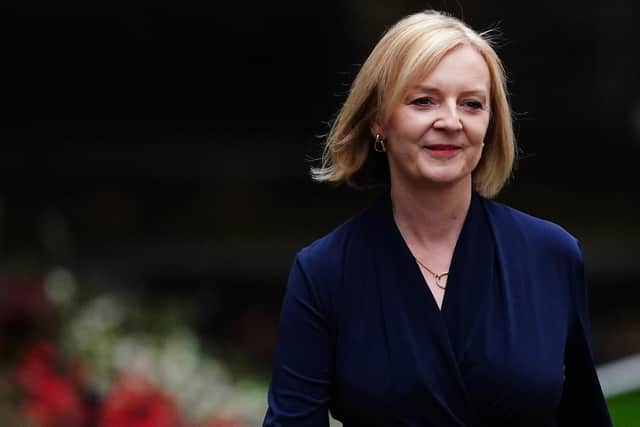Can Jarvis Cocker and Margaret Thatcher teach us about Liz Truss? - David Blunkett
Back in the summer my fellow Sheffielder, Jarvis Cocker, invited my wife, Margaret, and I to the Crucible Theatre in Sheffield for an evening of reminiscences about his memorabilia.
He had had the clever idea of digging all kinds of long-forgotten items out of his attic, which have made up his most recent publication, and a round of “Evenings with” – of which this was one.
Advertisement
Hide AdAdvertisement
Hide AdKnowing I was there, he produced my little pamphlet, ‘Building From the Bottom’ which had been published by the Fabian Society 40 years ago, three years after the election victory of Margaret Thatcher. So why is this relevant to the events of this week?


Jarvis read extracts from my foreword, which illustrated how we should learn from the past.
I recalled then that all of us had thought that “Margaret Thatcher was our best asset” in the lead up to the 1979 election.
After all, in the opinion polls, the then Prime Minister Jim Callaghan was miles ahead in the popularity stakes.
I then went on to recall “How wrong could we have been”.
Advertisement
Hide AdAdvertisement
Hide AdHow wrong were we later in the 1990s when we presumed that with the demise of Margaret Thatcher’s premiership, in November 1990, we would be odds-on to defeat John Major’s government in the ‘92 election.
After all, in the autumn of 1991, inflation was running at 8.5 per cent and unemployment was nudging up to the three million mark.
Major won that election in April ‘92, and as I pointed out in my last column for this newspaper, Labour had only just scraped home in 1964 after 13 years of Conservative administration.
So, here we are with Liz Truss, about as unprepossessing as it is possible to get and – as her opponent Rishi Sunak pointed out many times – with a tenuous grasp on economics and the realities of public finance.
Advertisement
Hide AdAdvertisement
Hide AdThe new Cabinet has just two members east of the Pennines – in Middlesborough South and East Cleveland and in Berwick upon Tweed but boasts no white men in the upper echelons of the new Government.
I use the term “new government” but, of course, it’s not. We are 12 and a half years into government led by the Conservatives. We are now on to the fourth Prime Minister in just six and a half years. Whilst we are some way off the astonishing record of Italy where, on the September 25, the 31st Prime Minister since the Second World War will take office, the lack of continuity, steady hand on the helm, or demonstration of statescraft is worrying.
But Labour would be deeply mistaken to believe that victory at the polls is a given.
As we approach the Party Conference season, Labour cannot afford complacency; must not presume that the Conservatives will implode, and instead must exude energy, political ideas and policies that flow from very different values to those of the Conservative leadership.
Advertisement
Hide AdAdvertisement
Hide AdThere may be less time than some presume before the electorate get the chance to give their verdict on the stewardship of the last few years, and a confident, forward-looking agenda will be vital to persuade people that there is a genuine alternative and that the Conservatives presumption of the “right to rule” can safely be brought to an end.
Shortly, I will present a paper on the future of learning and skills to Keir Starmer and my colleagues in the Labour Party.
It has become increasingly clear to me, as I worked on the proposals with those who have been good enough to contribute, that increased growth, a dramatic improvement in productivity and a rebalancing of our economy to give those of us in the regions (including Yorkshire) future economic success can only be achieved by a step change in the skills available for the future.
That is why it was astonishing that Liz Truss’s inaugural speech as Prime Minister did not mention learning or skills once.
Advertisement
Hide AdAdvertisement
Hide AdInstead she fell back on the old staples of building hospitals, schools and roads, very worthy, and already previously promised so many times as a long term contribution to increased economic activity.
Investment in learning and skills, both public and private, has fallen dramatically over the last decade and, instead of a vision of the future, we have had a sterile argument about vocational versus academic learning. Time, indeed, to put all this behind us and to collaborate in treating learning and skills as we would investment in infrastructure projects, in facilitating enterprise, innovation and competitiveness in an unstable and increasingly hostile global environment.
The expansive promises of tax cuts for the better off; of borrowing to replace existing revenue-raising measures not only to reduce energy bills but to fund health and social care, would have led to an absolute outcry if this were a Labour government, and this was a prime minister without a mandate or legitimacy.
But we are, as they say, “where we are”. What I think about Liz Truss, her Cabinet, and financial prudence, is as irrelevant as our predictions about the election of Margaret Thatcher in 1979.
Advertisement
Hide AdAdvertisement
Hide AdMy party must demonstrate not simply what’s wrong with those currently in power, but the hope, inspiration and popular and practical solutions to bring about economic recovery, social cohesion and greater equality in the years to come.